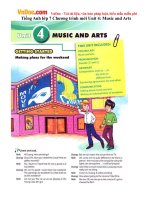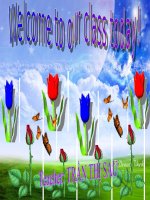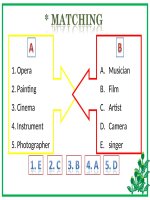Unit 04. Music and Arts. Lesson 5. Skills 1
Bạn đang xem bản rút gọn của tài liệu. Xem và tải ngay bản đầy đủ của tài liệu tại đây (1.2 MB, 18 trang )
10/30/17
WARM-UP: Fill in the blank with a word from the box to complete the sentences.
organising
poet
musician
decorated
opera
comedian
1. A funny man or woman in a film is a __________
2. I suggest __________ a show to raise money to help the poor in the
neighbourhood.
3. A person who writes poems is called a _________
4. A __________ is a person who plays a musical instrument or writes music,
especially as a job.
5. The temples at Angkor were __________ by artists with stone carvings.
6. Viet Nam has some kinds of traditional _________ such as 'Cheo' or 'Cai
luong'.
NEW LESSON
Unit 4:
musIC and art
SKILLS 1
READING
Vocabulary
-
water puppetry (n)
(thuật) múa rối nước
water puppet show (n)
màn múa rối nước
originate (v)
string (n)
control (v)
bắt nguồn, có nguồn gốc
sợi dây
điều khiển
are made of (exp)
được làm bằng
puppeteer (n)
theme (n)
rural (a)
nghệ sỹ múa rối
chủ đề
thuộc nông thôn
Checking vocabulary
-
water puppetry (n)
(thuật) múa rối nước
water puppet show (n)
màn múa rối nước
originate (v)
string (n)
control (v)
bắt nguồn, có nguồn gốc
sợi dây
điều khiển
are made of (exp)
được làm bằng
puppeteer (n)
theme (n)
rural (a)
nghệ sỹ múa rối
chủ đề
thuộc nông thôn
Before reading, discuss the questions below with a partner.
-
What kinds of traditional Vietnamese performance do you know about?
Cheo, cai luong, hat boi, mua roi nuoc, hat quan ho, choi trau ….
-
Do you know about water puppetry? Have you been to a water puppet show? If
yes, did you like it? Why/Why not?
Yes, I do. I have been to one when I came to Hanoi on holiday. I like water
puppetry because it’s fun and I can learn about history and culture of our
country.
Have you ever seen a water
puppetPUPPETRY
show? It is so special and fantastic. It’s a unique
WATER
Vietnamese tradition. Children love the performance, and tourists who come to Viet
Nam greatly enjoy this kind of art. Water puppetry is a traditional art form. It began in
the 11
th
century. It originated in the villages of the Red River Delta of North Viet Nam.
The show is performed in a pool. The puppets are supported by strings under the water
and controlled by the puppeteers behind a screen, so they appear to be moving on the
water. The puppets are made of wood and then painted.
The themes of the puppet shows are rural: the performances show everyday life in the
countryside and folk tales. There are stories about rice farming, fishing and Vietnamese
village festivals.
1. Find the words in the text which mean:
1. special or different
= unique
2. started
= began
3. showed or presented
= performed
4. from the countryside
= rural
5. events or celebrations
= festivals
2. Answer the following questions.
1. When did water puppetry begin?
th
- It began in the 11 Century.
2. Where does a water puppet show take place?
- It takes place in a pool.
3. Who are the puppets controlled by?
- They are controlled by puppeteers.
4. What are the puppets made of?
- They are made of wood.
5. What are water puppet shows normally about?
- They are about everyday life in the countryside and about folk tales.
SPEAKING
3. Match the types of music in A with the adjectives to describe them in B.
A
B
1. pop music
a. old, emotional
2. folk music
b. lively, exciting
3. rock and roll
c. quick
4. hip-hop/rap
d. sad, melodic
5. blues
e. popular, pleasant
4. Game: TIC TAC TOE (noughts & crosses)
With a partner, draw a tic tac toe board, like the one below. Then, write
numbers 1 to 9 in the boxes. You can put the numbers anywhere you like!
1
2
3
4
5
6
7
8
9
4. Game: TIC TAC TOE (noughts & crosses)
1. Give the names of two Vietnamese musical instruments.
2. Sing a song in English.
3. Who is your favourite singer? Why?
4. Talk for 30 seconds about what you see when you visit an art gallery.
5. How often do you go to a concert? Tell your partner about the last concert
you went to.
6. Who is your favourite Vietnamese musician? Why?
7. Talk for 30 seconds about your favourite instrument.
8. Name one of your favourite painters.
9. Who can draw the best in your class? What does he/she often draw?
4. Game: TIC TAC TOE (noughts & crosses)
Decide
go
which
first.
The
partner
is
'X',
first
player
which
chooses
is
a
'O'
and
who
will
box
and
calls
out
to
get
a number.
Example:
Player 1: I want number 2.
Player 2: OK, sing a song in English!
Then
he/she
has
to
sing
a
song
in
English
that box.
If the first player answers the question for that box correctly he/she can put an
'X' or an 'O' in the box. The first person to get three Xs or three Os in a row wins.
1x
1o
Name:
2x
3x
1. Give the names of
Cello ,piano,..
instruments
X
O
2. Sing a song
X
O
in English
3. Who is your
X
O
Because she/he
favorite
sings beautifully
singer?
4x
seconds about
X
O
what you see
6x
when you visit
Sometimes;
7x
6. Who is your
watch a often
music show?
favorite
musician
is…….
Tell about the singer
Vietnamese
you like best
musician ? Why?
X
O
name
7. Talk about 30
X
O
My favorite
instrument
seconds
about
your
is ….
favorite instrument.
9x
6. My favorite
5. How often do you
an art gallery .
8x
3o
4o
4. Talk for 30
5x
2o
8. Name one of
X
O
your
favorite painter.
Vietnamese
X
O
Name :
9. Who can draw the
5o
6o
7o
best
in your
class?
He/She
often
X
O
What
does
he/she
draws
………
8o
often draw?
9o
HOMEWORK
- Learn the new words.
- Practice reading the passage again.
+
- Do exercises B3, B4 (page 30 in workbook).
- Prepare for Unit 4: SKILLS 2
THANKS FOR YOUR ATTENTION!
Goodbye!
See you again!









